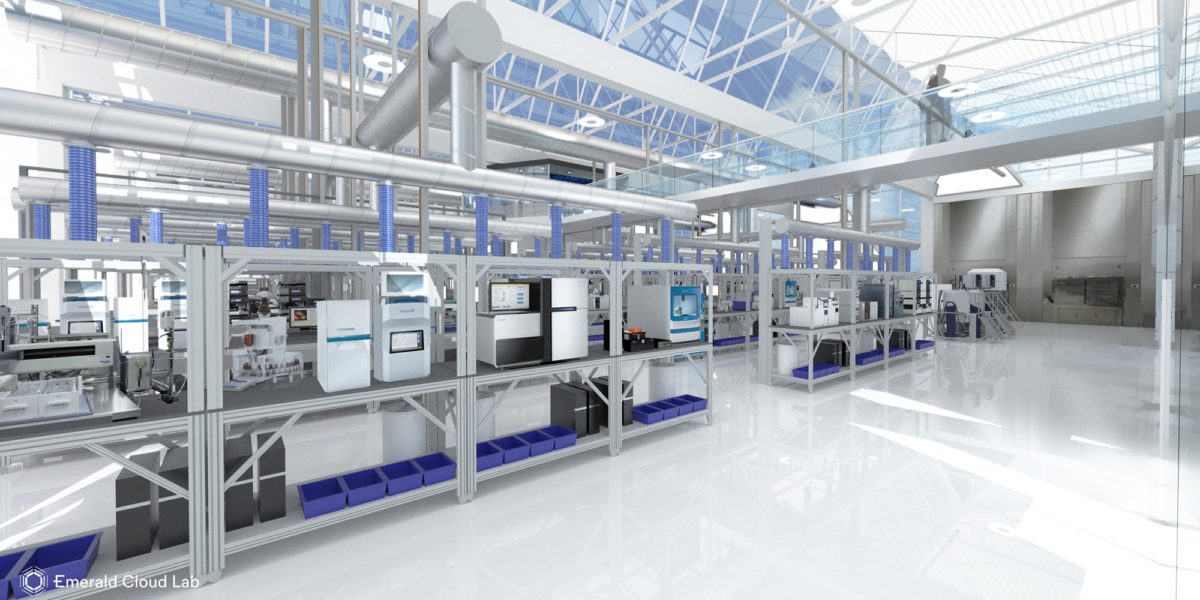In a move to advance Pittsburgh’s growing life sciences community, a new partnership between Carnegie Mellon University and San Francisco’s Emerald Cloud Lab will bring the world’s first academic cloud lab to the school.
Cloud labs are a new form of artificial intelligence technology aimed at making lab-based research more efficient and accessible. A remotely operated platform allows researchers to start and stop experiments as needed from the comfort of their own home or office, making it easier to schedule tests that might normally require someone to come in for the protocol in the middle of the night. The automated machines are also less time-consuming when running experiments than their human counterparts, and using them frees up time for investigators and other lab personnel to focus on the big picture aspects of research rather than the day-to-day tasks.
“Carnegie Mellon University is a world leader in artificial intelligence, machine learning, data science and the foundational sciences. There is no better place to be home to the world’s first university cloud lab,” said Rebecca W. Doerge, the Glen de Vries dean of the Mellon College of Science at CMU, in a statement. “Bringing this technology, which I’m proud to say was created by CMU’s alumni, to our researchers and students is part of our commitment to creating science for the future.”
The partnership comes on the heels of a historic $150 million grant to the university from the Richard King Mellon Foundation earlier this summer, to support new scientific discovery efforts at the school and create a new innovation hub at Hazelwood Green.
In the cloud lab itself will be robotics technology that researchers can remotely direct to run the experiments, as well as operational personnel to pick up any slack in terms of any specifications or maintenance required by researchers. The remote nature of the protocols not only makes the workload easier for researchers, according to CMU, but increases the possibilities for social distancing should that continue to be a concern. From there, the machines in the lab collect data and store it in a cloud-based server that can be accessed by lab personnel from anywhere, so long as they have a computer and internet connection. Plus, the way the server stores and organizes the data makes it easy for researchers to keep track of and to replicate with future tests run using the same code.
This new resource will enable students, faculty and other CMU-affiliated researchers to run over 100 unique experiments at the same time, and will be fully operational for 24 hours every day of the year as needed, eliminating the limitations of holidays or night shifts on lab tests, the school said. The cloud lab, set to start construction this fall, will be at a CMU-owned building in Bakery Square on Penn Avenue, right in the heart of Pittsburgh’s tech economy. It’s expected to be functional by next summer.
“The CMU Cloud Lab will democratize science for researchers and students,” Doerge said. “Researchers will no longer be limited by the cost, location or availability of equipment. By removing these barriers to discovery, the opportunities are limitless.”
The strengths of Pittsburgh’s tech economy are in robotics and automation, as exhibited by the heavy autonomous vehicle presence here. But life sciences will have a bright future here as well, with a top medical school and research institution at the University of Pittsburgh and hospital and healthcare systems like UPMC and Allegheny Health Network. New initiatives from startup community leaders like Innovation Works‘ AlphaLab Health are a sign of growing lab-based tech here, too.
Now, by infusing that industry with the technologies Pittsburgh has helped to perfect, the new CMU cloud lab could be a herald of more innovation to come in the life sciences here.
Sophie Burkholder is a 2021-2022 corps member for Report for America, an initiative of The Groundtruth Project that pairs young journalists with local newsrooms. This position is supported by the Heinz Endowments.Before you go...
Please consider supporting Technical.ly to keep our independent journalism strong. Unlike most business-focused media outlets, we don’t have a paywall. Instead, we count on your personal and organizational support.
3 ways to support our work:- Contribute to the Journalism Fund. Charitable giving ensures our information remains free and accessible for residents to discover workforce programs and entrepreneurship pathways. This includes philanthropic grants and individual tax-deductible donations from readers like you.
- Use our Preferred Partners. Our directory of vetted providers offers high-quality recommendations for services our readers need, and each referral supports our journalism.
- Use our services. If you need entrepreneurs and tech leaders to buy your services, are seeking technologists to hire or want more professionals to know about your ecosystem, Technical.ly has the biggest and most engaged audience in the mid-Atlantic. We help companies tell their stories and answer big questions to meet and serve our community.
Join our growing Slack community
Join 5,000 tech professionals and entrepreneurs in our community Slack today!

The person charged in the UnitedHealthcare CEO shooting had a ton of tech connections

From rejection to innovation: How I built a tool to beat AI hiring algorithms at their own game

Where are the country’s most vibrant tech and startup communities?



